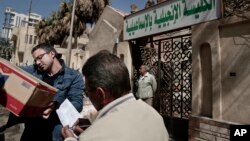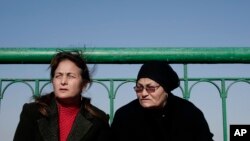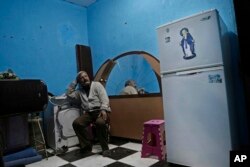In the past three days, Islamic State militants in Egypt's volatile northern Sinai region abducted four men accused of collaborating with the government, three of them during a brazen raid in the middle of a public market. Two of the men have been found slain while the others remain missing; Egyptian officials say that one of the slain men had his eyes plucked out and was set on fire before being shot to death.
Women are being threatened with punishment if they don't wear the niqab and farmers are being forced to pay financial tribute to IS under the guise of the “zakat” mandatory Islamic donation to charity. The militants have set up their own checkpoints especially on the roads around the city of Rafah, which borders the Gaza Strip. Passengers are forced to recite from the Quran before being allowed to pass, according to area residents and tribal leaders.
This recent show-of-strength campaign by IS loyalists in northern Sinai comes on the heels of a recent easing of the military campaign against them and represents a move to reassert their control over the local civilian population, according to residents, tribal leaders and officials.
“The messages the militants are sending are terrifying,” said a prominent tribal leader. “The numbers of militants is not that big ... But the army campaign stopped and the militants returned.”
The violence poses a fresh challenge to President Abdel-Fattah el-Sissi's government to put down an IS-led insurgency in northern Sinai and prevent spillover that at times has reached the Egyptian mainland.
Christian residents targeted by IS
The extremists have repeatedly targeted Christian residents, causing more than 100 Christian families to flee from the city of el-Arish. IS militants in northern Sinai recently vowed in a video message to step up a wave of attacks on the embattled Christian minority, a threat that highlights a possible shift in tactics — targeting vulnerable and less-defended civilians instead of the usual police and military targets. A devastating IS-claimed suicide bombing at a Cairo church in December killed nearly 30 people.
According to an employee of the North Sinai governor's office, militants at a checkpoint recently stopped a bus carrying female civil servants and threatened the women if they didn't start wearing the all-concealing niqab garment.
“They took our names and wrote them down, so if we don't follow their orders, they punish us,” said one of the female government employees.
Part of Sinai Peninsula a battleground
The official at the governor's office said that the women were given several days off so that additional security could be arranged.
The northern part of the Sinai Peninsula, bordering the Gaza Strip and Israel, has been a battleground since 2011, when the region sank into lawlessness after the 18-day uprising that led to the ouster of longtime autocratic President Hosni Mubarak.
But the militant campaign accelerated after the military overthrew elected Islamist President Mohammed Morsi in 2013.
El-Sissi, who as defense minister led Morsi's ouster, declared a state of emergency in northern Sinai in 2014. Hundreds of soldiers and police officers have been killed in the conflict and hundreds of houses along the Gaza border have been razed in order to stop the smuggling trade through cross-border tunnels.
Taxes on tunnels
Still, the insurgency has shown little sign of calming.
According to a second tribal leader, the militants are now raising cash by imposing taxes on the people running the smuggling tunnels.
The IS militants, he said, “are living at large in Rafah.”
The government employee and the tribal leders spoke on condition of anonymity for fear of reprisal. The Egyptian officials spoke on condition of anonymity because they weren't authorized to speak to the press.






